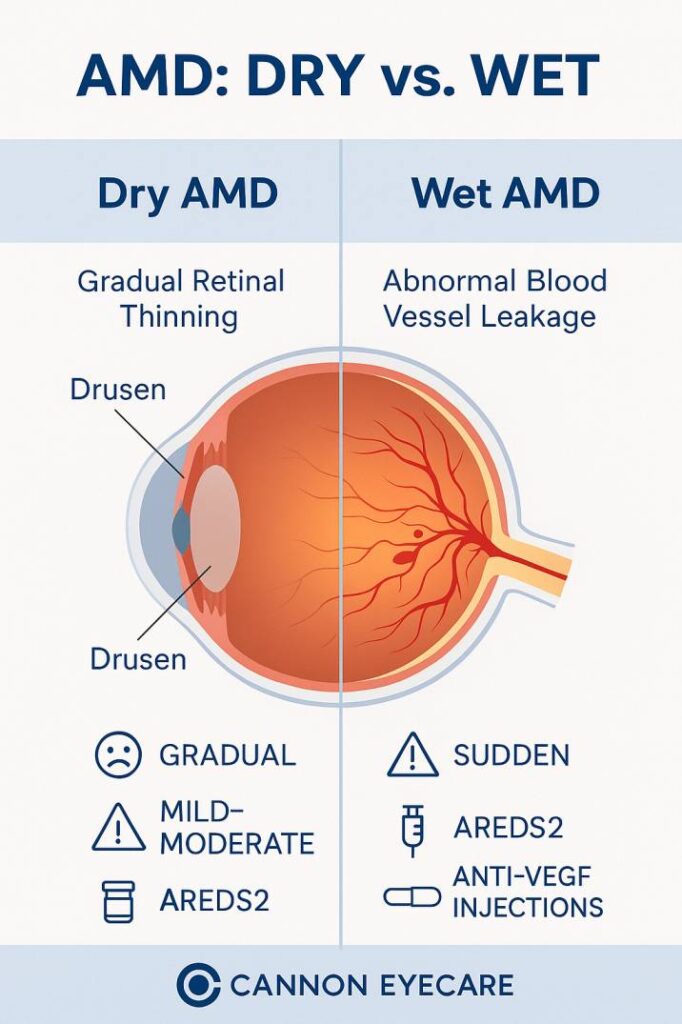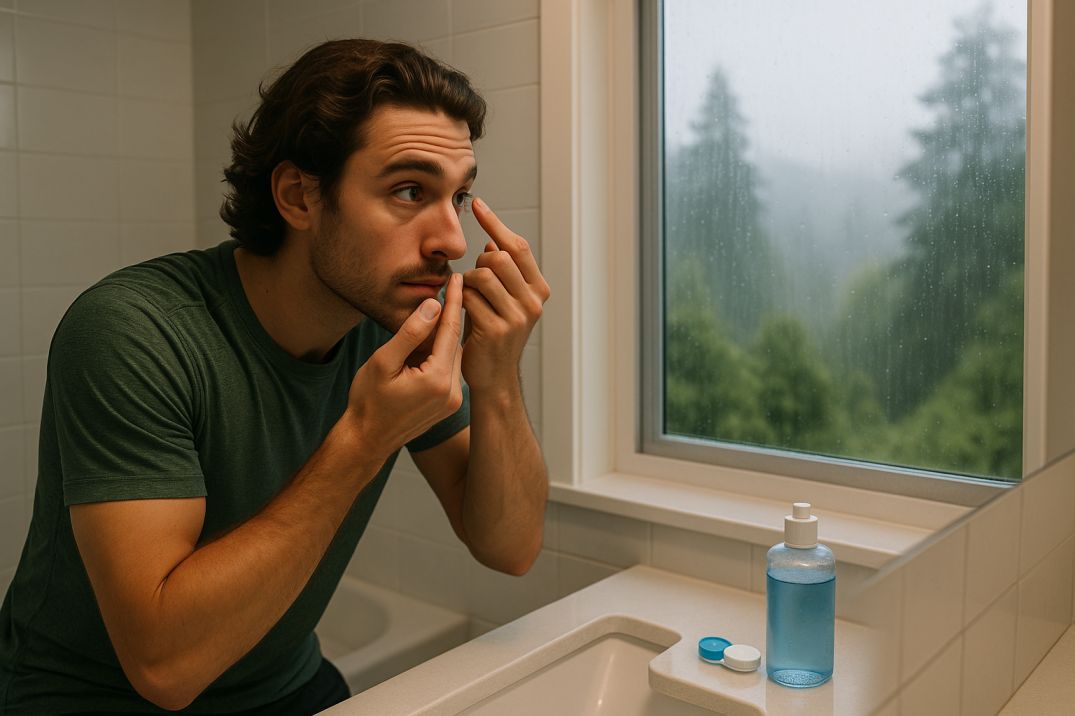Age-Related Macular Degeneration: Seattle Guide 2025
Age-related macular degeneration (AMD) is the leading cause of central vision loss in Seattle adults over 50. Discover its warning signs, risk factors, and life-changing treatments in 2025.
Key Takeaways: Protecting Vision from AMD in Seattle
-
AMD risk spikes after age 50—early detection and routine eye exams are critical, especially for Seattle’s aging population.
-
Dry and Wet AMD require different care—Dry progresses slowly; Wet needs immediate treatment to prevent rapid vision loss.
-
Seattle’s unique lifestyle factors matter—low winter light, high screen use, and sun glare all affect macular health.
-
Diet and exercise are powerful tools—leafy greens, omega-3-rich seafood, and 30 minutes of daily activity can reduce AMD risk by up to 40%.
-
Advanced care is here—Cannon EyeCare offers cutting-edge treatments like MicronJet™ injections, OCT imaging, and access to gene/stem cell trials.
-
Adaptation means independence—tools like smart lighting, voice tech, and local mobility services help Seattle residents thrive with AMD.
-
Community support matters—access free resources, support groups, and counseling through local programs like UW Medicine and Seattle Counseling Service.
What is Age-Related Macular Degeneration (AMD)?
Age-related macular degeneration (AMD) is a progressive eye disease that damages the macula – the central part of your retina essential for sharp, detailed vision. This condition can gradually make daily activities like reading, driving, and recognizing faces challenging for Seattle residents.
What are the Main Types of AMD?
AMD manifests in two primary forms:
-
Dry AMD: The most common type (affecting 85-90% of AMD patients), Dry AMD progresses slowly as the macula’s light-sensitive cells break down and thin over time.
-
Wet AMD: Less common but far more aggressive, Wet AMD involves abnormal blood vessels growing beneath the retina. These fragile vessels leak fluid and blood, causing rapid central vision loss.
Key AMD Risk Factors & Impact
-
Prevalence & Age Risk: Affecting over 11 million Americans, AMD risk rises significantly after age 55. Early detection is critical for Seattle seniors.
-
Vision Consequences: While AMD doesn’t cause total blindness, unmanaged progression leads to profound central vision loss – severely impacting independence, driving safety, and quality of life.
Who is Most at Risk for AMD in Seattle?
Understanding your personal risk factors empowers proactive eye health. AMD develops from a combination of genetic predisposition and lifestyle influences. Key risks include:
What Are the Key Risk Factors for AMD?
-
Age (50+): Risk climbs significantly after age 50 – a critical consideration for Seattle’s aging population.
-
Family History: Genetics play a major role. Having a close relative with AMD increases your likelihood.
-
Race: People of European ancestry face higher incidence rates.
-
Smoking: Clinically proven to double your AMD risk. Quitting is the single most impactful change.
-
Sun Exposure: Cumulative UV damage harms retinal cells. Seattle’s summer glare demands quality UV protection.
-
Dietary Deficiencies: Low intake of leafy greens (rich in lutein/zeaxanthin) and diets high in saturated fats contribute.
-
Systemic Health: High blood pressure, obesity, and cardiovascular disease are linked to AMD progression.
How Do You Recognize Early Macular Degeneration in Seattle?
AMD often progresses silently – painless and subtle at first. Many Seattle residents miss the early signs until vision loss advances. Watch for these critical symptoms:
Top 5 Warning Signs of AMD
-
Blurred Central Vision: Increasing fuzziness when looking directly at objects.
-
Face Recognition Difficulty: Struggling to identify familiar faces across a room.
-
Distorted Lines (Metamorphopsia): Straight edges appearing wavy or bent (test instantly with our digital Amsler grid below).
-
Declining Visual Acuity: Needing brighter light for reading or detail work; trouble reading street signs.
-
Faded Color Perception: Reduced vibrancy, especially in central vision.
How is AMD Diagnosed at Cannon EyeCare’s Seattle Clinic?
Early AMD detection requires advanced technology and specialist expertise. Our Seattle diagnostic protocol includes:
4-Step AMD Diagnostic Process
-
Comprehensive Visual Acuity Test
Measures clarity at multiple distances to establish baseline vision function. -
Dilated Retinal Examination
Our optometrists inspect your macula for drusen (yellow lipid deposits) and retinal abnormalities using high-magnification lenses. -
Digital Amsler Grid Analysis
Detects early distortions: Patients track line warping or blind spots on our backlit grid system – more sensitive than paper versions for Seattle’s low-light conditions. -
Advanced Retinal Imaging Suite
-
OCT (Optical Coherence Tomography): Creates cross-sectional macula scans detecting microscopic fluid (Wet AMD) or thinning (Dry AMD)
-
Fluorescein Angiography (FA): Maps leaking blood vessels via safe dye injection (used only when Wet AMD is suspected)
-
Dry vs. Wet AMD: Key Differences for Seattle Patients
Dry AMD (Atrophic)
-
Prevalence: Most common form (85-90% of AMD cases)
-
Progression: Gradual vision decline over the years
-
Symptoms: Slow central vision blurring, difficulty adapting to dim light (common in Seattle’s gray winters)
-
Severity: Mild to moderate; rarely causes complete blindness
-
Cannon EyeCare Approach: Custom AREDS2 supplements + biannual OCT monitoring at our Seattle clinic to track drusen
Wet AMD (Neovascular)
-
Prevalence: Less common (10-15%) but more aggressive
-
Progression: Rapid deterioration in weeks/months
-
Symptoms: Sudden distortion (wavy lines), blind spots, dramatic vision drop
-
Severity: High risk of severe central vision loss
-
Cannon EyeCare Urgent Protocol: Same-day anti-VEGF injections using Seattle’s only MicronJet™ needle-free delivery system
AMD Treatment Advancements in 2025: Seattle’s Cutting-Edge Care
Current Gold-Standard Treatments
Dry AMD Management:
-
AREDS2 Supplements: Custom-formulated antioxidant blends proven to slow moderate AMD progression (available through Cannon EyeCare’s personalized nutrition plans)
-
Diet Optimization: Emphasis on Pacific Northwest-sourced leafy greens, salmon, and walnuts rich in retina-protecting nutrients
-
Low Vision Rehabilitation: Partnering with Seattle’s Lighthouse for the Blind for adaptive technology training
Wet AMD Treatment (MEDICAL EMERGENCY):
-
Anti-VEGF Injections: Aflibercept/Ranibizumab delivered via Seattle’s only needle-free MicronJet™ system (monthly/quarterly)
-
Laser/Photodynamic Therapy: Reserved for specific lesion types at our First Hill satellite clinic
2025 Breakthroughs: Seattle’s Research Frontier
Cannon EyeCare partners with Swedish Medical Center and UW Medicine on these emerging therapies:
-
Gene Therapy Trials
Single-injection treatments targeting VEGF overproduction (Phase III trials now enrolling Seattle patients) -
Stem Cell Implants
Retinal pigment epithelium (RPE) transplantation to regenerate damaged macula cells -
Port Delivery Systems
Susvimo™ implants releasing anti-VEGF drugs for 6+ months – reducing injection frequency. -
Nanoparticle Technology
Smart drug carriers bypassing treatment resistance in complex Wet AMD cases
Thriving with AMD in Seattle: Local Lifestyle Adaptations
Adjusting to vision changes empowers independence. Cannon EyeCare’s Seattle patients use these tailored strategies:
Seattle-Specific Daily Living Solutions
Tech & Accessibility
-
Digital Tools: Activate voice assistants (Alexa/Siri), text-to-speech apps, and high-contrast device settings
-
Free Resources: Borrow audiobooks/enlarged-print titles from Seattle Public Library’s LightHouse Low Vision Collection
-
Home Monitoring: Sync AI-powered Amsler grid apps with our clinic’s portal
Home & Neighborhood Safety
-
Light Maximization: Leverage summer’s 16-hour daylight; install smart bulbs (e.g., Philips Hue) for gray winters
-
Contrast Enhancements:
-
Apply neon tape to stair edges (e.g., Queen Anne hillside homes)
-
Use voice-activated smart switches (Amazon Echo Show)
-
-
Mobility Aids: Request free Metro Access shuttle service for medical appointments
Emotional & Community Support
-
Local Support Groups:
-
Cannon EyeCare’s monthly AMD coping workshops (Virtual/in-person)
-
Washington DSB’s Seattle Vision Loss Connections
-
-
Mental Health:
-
UW Medicine’s Low Vision Behavioral Therapy program
-
Medicaid-covered counseling at Seattle Counseling Service
-
Staying Active in the PNW
-
Daylight Activities: Walk Green Lake’s paved loop or Discovery Park trails
-
Adaptive Recreation:
-
Seattle Parks & Rec’s blind-friendly kayaking (Lake Union)
-
The Mountaineers’ Sensory Hikes (Rattlesnake Ledge)
-
-
Home Fitness: Audio-guided yoga via Kinetic Light (Seattle-based nonprofit)
AMD Prevention in Seattle: Your Proactive Vision Protection Plan
Leverage Seattle’s natural advantages – abundant farm-fresh foods and active lifestyle culture – to significantly reduce your AMD risk. Evidence shows these steps work:
Seattle’s 5-Point AMD Defense Strategy
-
Eliminate Smoking & Vaping
The #1 controllable risk. Tap Swedish Medical Center’s Free Seattle QuitLine (206-787-QUIT) or Cannon EyeCare’s cessation coaching. -
Eat the Pacific Northwest Rainbow
Build meals around:-
Leafy greens (Kale, spinach from Pike Place Market)
-
Colorful produce (Blueberries from Cascadian farms, WA-grown carrots)
-
Omega-3-rich fish (Wild-caught salmon from Ballard Fish Market)
→ Join our “Macula Menus” nutrition workshops at PCC Community Markets
-
-
Master the Seattle Sun Paradox
-
Wear polarized sunglasses (even on cloudy days) – UV penetrates 80% of cloud cover
-
Use daily blue-light blockers for tech work (Amazon/Microsoft campus-approved lenses)
-
Track neighborhood UV levels via UW Environmental Health’s real-time map
-
-
Move Like a Northwesterner
-
Rain-proof exercise: Swim at Medgar Evers Pool, walk Green Lake’s covered path
-
Aerobic benefits: 30-min daily activity lowers AMD risk 40% (UW Medicine study)
-
Vitamin D boost: Critical during Seattle’s dark months – supplement if needed
-
-
Control Systemic Health
Partner with your primary care provider to:-
Manage hypertension (Group Health’s Seattle Heart Program)
-
Optimize cholesterol (Fred Hutch’s lipid management guidelines)
-
Monitor diabetes (Virginia Mason’s retinal coordination protocol)
-
Protecting your vision from age-related macular degeneration starts with awareness, early detection, and access to expert care. Whether you’re managing AMD or aiming to prevent it, taking proactive steps today can safeguard your independence and quality of life tomorrow.
Ready to take control of your eye health?
Schedule a comprehensive AMD screening with Cannon EyeCare in Seattle and explore personalized treatment options, advanced diagnostics, and supportive resources—all in one trusted place.
FAQs
-
Macular degeneration is an eye disease that damages central vision, making it hard to see fine details needed for daily activities like reading or recognizing faces




